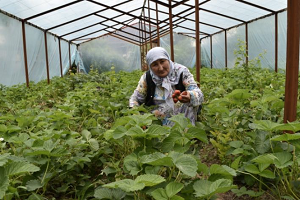
Description of the project: WECF and Youth Ecological Center (YEC) empower Tajik rural women groups to boost the energy transition and agro-ecology in their villages. 155 women and 11 men from 4 rural organizations participated in technical trainings on sustainable water and sanitation, organic agriculture, homemade efficient stoves and solar technologies. Greenhouses allow farmers to grow vegetables and fruit seedlings and protect crops from climate impacts. Thanks to WECF’s Women2030 training tools used by YEC, the women gained knowledge on the Sustainable Development Goals (SDGs) and contributed to writing a shadow report on SDG implementation in Tajikistan, making gender focused policy recommendations in national consultation meetings. YEC and WECF encourage the rural women to create their own enterprise for a sustainable local economy.
Climate impact: Tajikistan’s forest cover has been halved in 50 years, due to heavy use of fuel wood. Coal production is planned to increase tenfold by 2030. 90 % of the soil surface is degraded. Transition to safe renewable energy and food production lacks institutional and financial support. This project develops accessible and affordable renewable energy technologies and organic farming skills for rural populations. Improved stoves, ecological insulation and solar water heaters help reduce CO2 emissions by 1 ton per household per year, while solar greenhouses contribute to energy transition.
Gender impact: Gender stereotypes and traditional gender roles still prevail in Tajikistan. Discrimination in the labor market is strong, with most women being informally employed in agriculture. The project empowers women via technical trainings in innovative energy and agricultural technologies. With the acquired skills they gain a greater social status and become role models for others. Furthermore, their new revenues improve their financial independence and allow them to participate in local and national governance.
Scalability/replicability: Linking practical trainings with policy processes and boosting the emergence of a sustainable local economy is a good basis for up-scaling. YEC and WECF enable women groups from different villages to exchange their experience and learn from each other, as well as to actively contribute to transition policies. Tutorial videos have been produced to disseminate the technologies further. The technical equipment is designed on site and materials are locally sourced, so that the women can easily pass on their skills and competences to others.